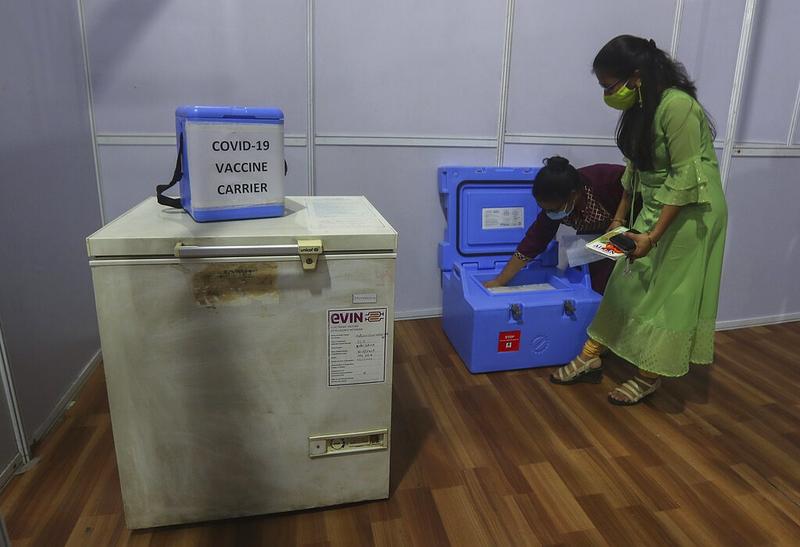Modi urges Indians to ignore skeptics, saying injections help win virus battle
 In Jan 7, 2021, file photo, health workers prepare for a trial run of COVID-19 vaccine, before preparing to roll-out an inoculation program to stem the coronavirus pandemic, in Mumbai, India. (RAFIQ MAQBOOL, FILE / AP)
In Jan 7, 2021, file photo, health workers prepare for a trial run of COVID-19 vaccine, before preparing to roll-out an inoculation program to stem the coronavirus pandemic, in Mumbai, India. (RAFIQ MAQBOOL, FILE / AP)
An Indian sanitation worker has begun what is set to be the world's largest vaccination campaign against COVID-19. Receiving the first injection in Delhi on Saturday, Manish Kumar, 33, became an instant popular name in India's media.
On the first day of inoculations about 100 people were voluntarily vaccinated in each of the 3,006 centers in India using a local vaccine, Covaxin, produced by Bharat Biotech and using a joint product, the govt said
"These vaccines will help India win the battle against the virus," Prime Minister Narendra Modi told healthcare workers in a video conference on Saturday.
The immunization campaign with more than 1.3 billion people is part of the global effort to fight the virus. India's COVID-19 infection tally rose to 10,557,985 on Sunday, the second-highest in the world after that of the United States, and its death toll reached 152,274, India's Ministry of Health and Family Welfare said.
Modi's office said earlier that "this will be the world's largest vaccination program, covering the entire length and breadth of the country".
"Considering the portion of the world's total population in India, the vaccination effort will certainly contribute to humankind's battle against the virus," said Hu Shisheng, director of the Institute of South Asian Studies at the China Institutes of Contemporary International Relations in Beijing.
ALSO READ: India launches 'one of world's largest' vaccination drives
On the first day of inoculations about 100 people were voluntarily vaccinated in each of the 3,006 centers in India using a local vaccine, Covaxin, produced by Bharat Biotech and using a joint product, the government said.
'For a healthy planet'
"A vaccine, which was earlier believed to be impossible in such a short time period, has become a reality thanks to efforts of our scientists, doctors and innovators," Modi said on Saturday. "India is ready to do everything possible for a healthy planet."
Hu said: "It is not surprising at all that India is able to produce its own vaccines. Though India lags behind in many fields such as machinery, the country is known for its pharmaceutical industry, with a few leading drug enterprises, thus it can be said that its domestically made vaccines will have good efficiency and be relied upon."
Indian pharmaceutical companies have always worked closely with other countries, especially China, in various fields, Hu said.
India's Health Minister, Harsh Vardhan, had earlier said COVID-19 vaccines would be made available free across the country.
The Information and Broadcasting Minister, Prakash Javadekar, said earlier that a coronavirus vaccine developed by AstraZeneca and Oxford University being produced locally by the Serum Institute of India, the world's largest vaccine maker by volume, was approved on Jan 1.
It was reported that Modi would not immediately take the vaccine himself, with nurses, doctors and other essential workers being the priority. Thirty million frontline workers will be included in the first phase of inoculations, and nearly 300 million will have been vaccinated by the end of the second phase, Modi said.
He urged Indians to get vaccinated and not pay heed to any anti-vaccine propaganda.
Li Jiasheng, a researcher on international relationships focusing on South Asia at Xi'an Jiaotong University of China, said: "Pandemic control and vaccination are not one thing. They are separate efforts in India."
READ MORE: Official: India wants Pfizer to do local study for vaccine approval
However, a marketing professional in Bangalore aged 29 who did not want to be identified said that not only did some in India think being vaccinated was a waste of time, others maintained that COVID-19 is a myth.
He was skeptical about vaccines eventually being free for everyone, he said.
"For example, some private hospitals can take advantage of it to make profit."
Li said: "The vaccine drive will put to the test the implementation and ability of the Indian government, because its states are loosely connected to each other. The Indian government needs to show its strong governance to win this combat with the pandemic."


